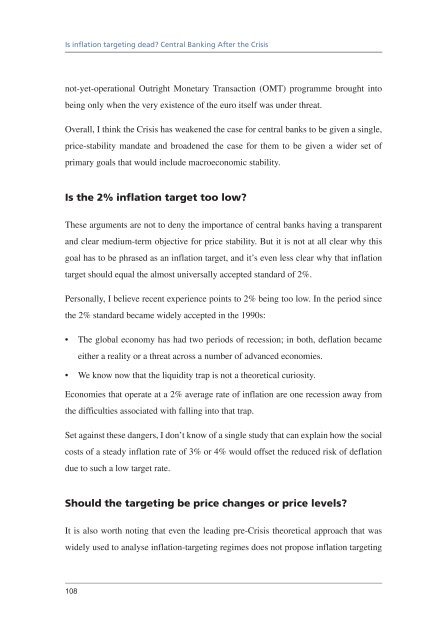Is inflation targeting dead? Central Banking After the Crisis - Vox
Is inflation targeting dead? Central Banking After the Crisis - Vox
Is inflation targeting dead? Central Banking After the Crisis - Vox
You also want an ePaper? Increase the reach of your titles
YUMPU automatically turns print PDFs into web optimized ePapers that Google loves.
<strong>Is</strong> <strong>inflation</strong> <strong>targeting</strong> <strong>dead</strong>? <strong>Central</strong> <strong>Banking</strong> <strong>After</strong> <strong>the</strong> <strong>Crisis</strong>not-yet-operational Outright Monetary Transaction (OMT) programme brought intobeing only when <strong>the</strong> very existence of <strong>the</strong> euro itself was under threat.Overall, I think <strong>the</strong> <strong>Crisis</strong> has weakened <strong>the</strong> case for central banks to be given a single,price-stability mandate and broadened <strong>the</strong> case for <strong>the</strong>m to be given a wider set ofprimary goals that would include macroeconomic stability.<strong>Is</strong> <strong>the</strong> 2% <strong>inflation</strong> target too low?These arguments are not to deny <strong>the</strong> importance of central banks having a transparentand clear medium-term objective for price stability. But it is not at all clear why thisgoal has to be phrased as an <strong>inflation</strong> target, and it’s even less clear why that <strong>inflation</strong>target should equal <strong>the</strong> almost universally accepted standard of 2%.Personally, I believe recent experience points to 2% being too low. In <strong>the</strong> period since<strong>the</strong> 2% standard became widely accepted in <strong>the</strong> 1990s:• The global economy has had two periods of recession; in both, deflation becameei<strong>the</strong>r a reality or a threat across a number of advanced economies.• We know now that <strong>the</strong> liquidity trap is not a <strong>the</strong>oretical curiosity.Economies that operate at a 2% average rate of <strong>inflation</strong> are one recession away from<strong>the</strong> difficulties associated with falling into that trap.Set against <strong>the</strong>se dangers, I don’t know of a single study that can explain how <strong>the</strong> socialcosts of a steady <strong>inflation</strong> rate of 3% or 4% would offset <strong>the</strong> reduced risk of deflationdue to such a low target rate.Should <strong>the</strong> <strong>targeting</strong> be price changes or price levels?It is also worth noting that even <strong>the</strong> leading pre-<strong>Crisis</strong> <strong>the</strong>oretical approach that waswidely used to analyse <strong>inflation</strong>-<strong>targeting</strong> regimes does not propose <strong>inflation</strong> <strong>targeting</strong>108














